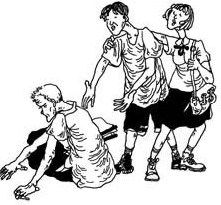 What will you do when you see an old person falling to the ground? Your first reaction may be helping him/her up. Hold on, you may get yourself into trouble. The old man or woman may grasp you by your arm and claim that you pushed him/her down. If the old person has broken his/her arms or legs, you will have to pay handsomely.
What will you do when you see an old person falling to the ground? Your first reaction may be helping him/her up. Hold on, you may get yourself into trouble. The old man or woman may grasp you by your arm and claim that you pushed him/her down. If the old person has broken his/her arms or legs, you will have to pay handsomely.
That is not a bizarre scenario one has made up. It happens often. "Then", you may ask, "who will dare to help a fallen old person in streets?" That's right. Nowadays, few will do. Take an event that happened not long ago.
In a downtown plaza in Nanjing, a man of about 70 fell to the ground, foaming at the mouth. He fainted several times while trying to call for emergency rescuers with his mobile phone. Passers-by watched but none moved to help. They informed an urban administrative officer nearby.
People did not act to help the old man for fear of being accused of causing his fall. Once the old man or his relatives raised such an accusation, the helper will find it difficult to prove otherwise. This, again, is not exaggeration. People have learned a lesson from a case well known throughout the country.
It happened in the same city of Nanjing. One day in July 2007, an old woman surnamed Xu broke her shin when getting off a bus. Peng Yu, a young man who was also alighting from the bus, helped the woman to a hospital and gave 200 yuan to her relatives for initial treatment. Xu claimed that she fell because Peng bumped into her. Peng said he did not collide with Xu, but that he helped her purely out of fellow feeling. A passer-by, who had seen what happened, proved Peng's innocence in court when the case was heard. The court, however, ruled that Peng was partly responsible and ordered him to pay 45,876 yuan, or 40 percent of the losses the old woman suffered.

The court based the verdict on its reasoning. It said Peng's action went against common sense because he "could have well left the scene if he had not caused the woman to fall, but he didn't choose to do so".
The court said, "Reasoning from logic, Peng was most likely the one who collided with the old woman, for Peng admitted he was the first to descend from the bus and it was not possible for a culprit other than Peng to escape the scene easily". The court said if Peng had been intent on doing a good deed, "a more reasoned move would be catching the culprit rather than helping the fallen woman up".
The second reason the court based its verdict on was that Peng had paid 200 yuan for the medical treatment. "If he had not collided with the woman, he would not have paid the money". Chen, the witness, was present at the court and insisted that Peng was innocent. But the court did not take his word for it.
The obviously absurd ruling of the Nanjing court set an extremely bad precedent. It encourages possible extortion by receivers of help in accidents and punishes people who help them, and scares away those who may be inclined to help. In fact, there have been many media reports of similar cases in other cities. The consequence is that few people would rescue a stranger lying on the ground injured or in a coma. I believe that on-lookers in the case mentioned first in this article wanted to help the old man but they dared not.
Many people, as is demonstrated by those who wrote comments on the abovementioned cases, have raised the question: "What happened to our social ethics? Who will help our senior citizens who may faint and fall on the street?
A 75-year-old man apparently knows how to save himself under such circumstances. A few months ago, the man in Xiaguan, Nanjing, fell from a bus and collapsed. Before he lost consciousness, he yelled: "I fell by myself. Nobody is responsible." On hearing that, several passers-by moved to help him.
What an irony.
About the author:
刘式南 高级编辑。1968年毕业于武汉华中师范学院(现华中师范大学)英文系。1982年毕业于北京体育学院(现北京体育大学)研究生院体育情报专业。1982年进入中国日报社,先后担任体育记者、时政记者、国际新闻编辑、要闻版责任编辑、发稿部主任、《上海英文星报》总编辑、《中国商业周刊》总编辑等职。现任《中国日报》总编辑助理及专栏作家。1997年获国务院“特殊贡献专家政府津贴”。2000年被中华全国新闻工作者协会授予“全国百佳新闻工作者”称号。2006年获中国新闻奖二等奖(编辑)。
相关阅读:
Where do officials do their jobs?
Kids should study less, play more
See-through mechanism for officials
Public mood is never to be ignored
